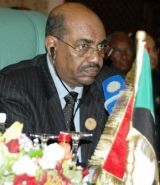Sudan president opposes UN force in Darfur
June 6, 2006 (KHARTOUM) — U.N. Security Council members were unable to convince Sudan’s President Omar Hassan Al-Bashir on Tuesday of the need for a robust peacekeeping mission to help protect civilians in the violent Darfur region, diplomats said.
 The 15-nation Council, represented by 10 ambassadors and five deputy ambassadors, visited Sudan for the first time to try to convince the Khartoum government the United Nations did not intend to send an invasion force to the western region or depatch troops without Sudan’s consent.
The 15-nation Council, represented by 10 ambassadors and five deputy ambassadors, visited Sudan for the first time to try to convince the Khartoum government the United Nations did not intend to send an invasion force to the western region or depatch troops without Sudan’s consent.
But Bashir played “bad cop”, said one envoy at the two-hour closed-door meeting.
Others said he argued the African Union, now in Darfur, could do the job by itself, rather than some 10,000 peacekeepers the United Nations is planning to help quell the violence that has driven more than 2.5 million people from their homes.
Foreign Ministry spokesman Jamal Ibrahim said the government would take up the issue after the United Nations and the African Union complete a military assessment mission this week and discuss their findings with Khartoum. After that respective political parties would be consulted.
“So I think we are going on in the right direction,” Ibrahim said after the council met Foreign Minister Lam Akol, a member of the former rebel Southern Sudan Liberation Movement, considered more sympathetic to the world body than other government members.
Sudan signed a peace agreement with the main Darfur rebel faction on May 5, but two other rebels groups refused to join.
Since then efforts have intensified to persuade Khartoum to let the United Nations take over peacekeeping from 7,000 badly equipped and under-funded African Union troops.
Bashir, a general who controls the Sudanese army, at first opposed African Union peacekeepers also but then relented. But so far he has given no sign of agreeing to a U.N. force, although he consented to the military planning mission.
The Darfur peace agreement, signed in Arusha, Nigeria, also provided for a more robust mandate for the African Union so it could protect civilians, at least 200,000 of whom have died since 2003 through fighting, hunger and disease.
Britain’s U.N. ambassador, Emyr Jones Parry, leader of the delegation, said at the news conference, “There is no question of an intervention force”
The fighting in Darfur escalated in early 2003 between African rebel farmers and Arab tribesmen, at one time armed by the government and blamed for much of the ethnic cleansing but not all of the fighting and mayhem.
Bashir, as well as Sudanese newspaper commentators, argue that a U.N. force entering under enforcement provisions in Chapter 7 of the U.N. Charter would have free military rein. Chapter 7 is used for parts of nearly all peacekeeping operations for protecting civilians or for self-defence.
According to Jones Parry, Chapter 7 “is not an open ended use of force (and) is not targeted at government but those who want to undermine the (peace) agreement.”
To the rebels, he said: “Our message would be we’d like you to sign and if you start impeding the agreement then the Security Council will be watching very carefully indeed.”
Russia’s deputy ambassador Konstantin Dolgov, said Sudanese leaders were strong in their opposition to Chapter 7, “Once again, we have to take into consideration the views of the Sudanese government,” he said
The Security Council goes to Addis Ababa, Ethiopia on Wednesday where the head of U.N. peacekeeping, Jean-Marie Guehenno, will consult with African Union officials on their joint military assessment mission. The council will also visit Darfur, Chad and the Democratic Republic of the Congo.
(Reuters)
